Global Mental Health Delivery
Background & Rationale:
The mental healthcare gap is enormous in the world, primarily in developing countries. Due to the lack of psychiatrists and psychologists to address the increasing burden of mental illness globally, innovation is essential in mental health delivery. In this context, the certificate in global mental health delivery course has been launched to train students, public health professionals, mental health professionals and medical officers on innovative community-based mental health delivery with examples from Nepal.
Goals & Objectives:
- Provide foundational knowledge on global mental health and community mental health
- Discuss innovative community-based mental health projects with examples from Nepal
- Provide hands-on training on community-based mental health projects in Dang and Chitwan districts of Nepal
Stakeholders & Providers
Organizing Institution / Lead Organization:
- Health Foundation Nepal, a non-profit organization in the United States and Nepal since
2013
Collaborating Partners / NGOs / Academic Institutions:
- Local and Global Initiative for Mental Health Equity(LIME), Department of Psychiatry at
Massachusetts General Hospital, USA
- Nepal Institute of Mental Health, a non-profit organization in Nepal since 2021
Facilitators / Trainers/ Advisors:
- Course Director
- Adjunct Faculties
- Program Coordinators

Shreedhar Paudel, MD, MPH
- Psychiatrist, Massachusetts General Hospital
- Assistant Professor of Psychiatry, Harvard Medical School
- President, Cofounder and Director of Mental Health, Health Foundation Nepal (USA)
- Executive Director and Cofounder, Nepal Institute of Mental Health (NIOMH)
Sanjay Yadav, MD

- Associate Professor of Psychiatry, Penn State College of Medicine
- Cofounder and President of NIOMH
Jagan Subedi, MD

Psychiatrist, Cofounder and Executive Member of NIOMH
Rabin Dahal, MD

Assistant Professor of Psychiatry, Yale School of Medicine
Saraswati Dhungana, MD, PhD

Assistant Professor of Psychiatry, Tribhuvan University Teaching Hospital, Nepal
Jayanti Dhungana, MD

Dysp. Consultant Psychiatrist, Nepal Police Hospital, Nepal
Khagendra Kafle, MD

Associate Professor of Psychiatry, Chitwan Medical College, Nepal
Anuradha Acharya, MA

Consultant Psychologist, HFN and NIOMH, Nepal
Arham Javaid
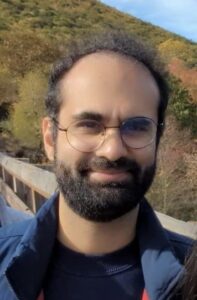
Psychiatry Resident, BronxCare Health System, New York, USA
Ms. Anu Aryal

PhD Candidate, UCLA Fielding School of Public Health, Los Angeles, CA, USA
Dr. Sudhamsu Gautam
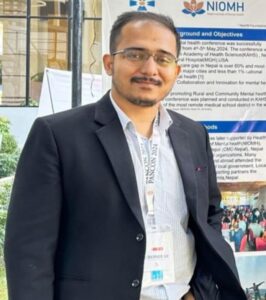
Research Collaborator, Nepal Institute of Mental Health, Chitwan, Nepal
Target Audience
- Medical students
- Medical Graduates
- NGO staff
- Teachers and educators
- General public interested in mental health
Program Structure
Duration:
8 Weeks
Format:
- Hybrid (online + field)
- 4-week virtual
- 4 weeks on-site: (if interested)
Weekly Commitment:
~10/week (2 sessions per week, self-reading material, webinars, Lectures)
Eligibility Criteria:
Interested candidate with a letter of Interest
Medium of Language: English and Nepali
Curriculum Outline
Current Courses
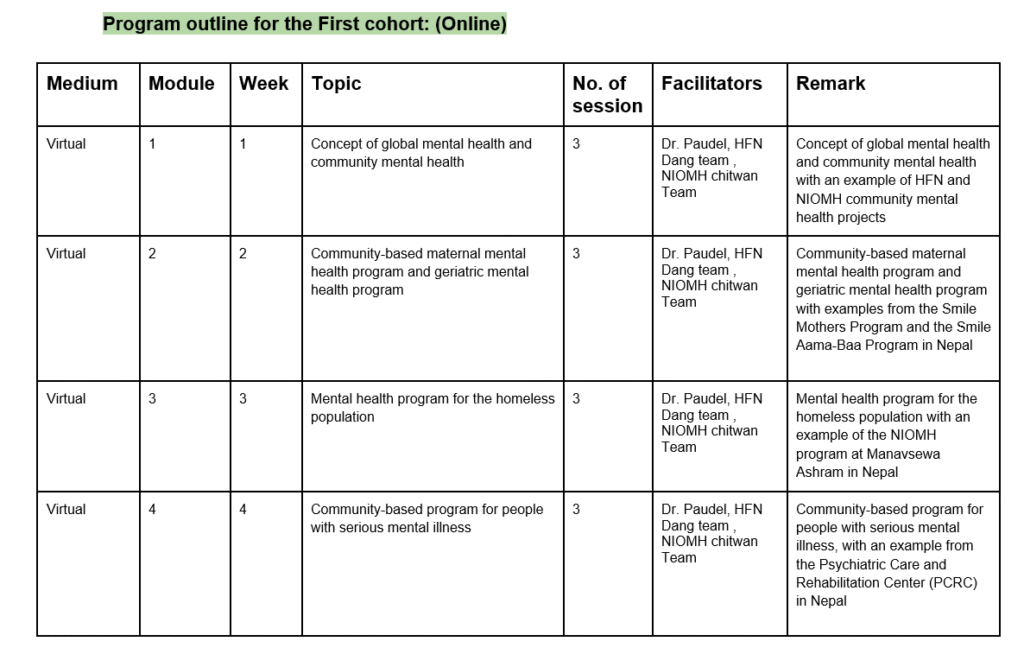
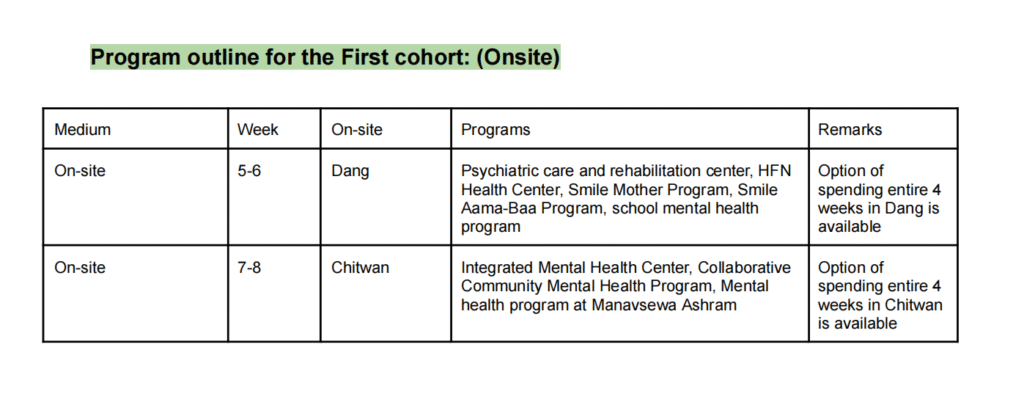
Future Updates
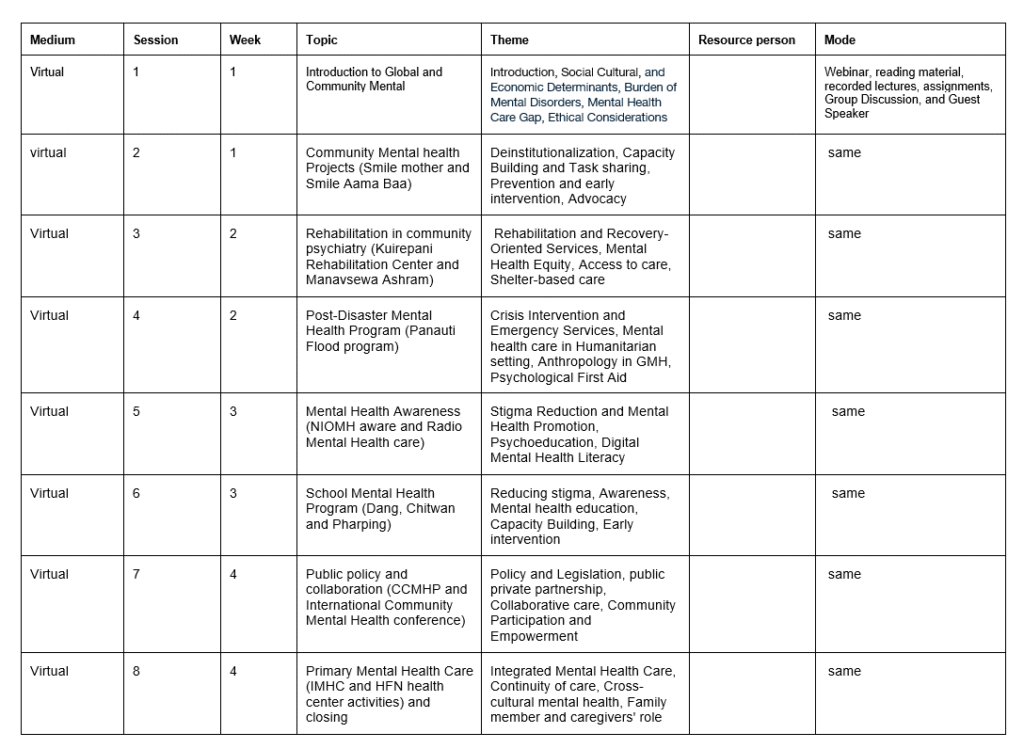
Teaching & Learning Mediums
- Live webinars / Zoom
- Downloadable reading materials (PDFs, handouts)
- Short educational videos
- Roleplays / simulations
- Group chats on Slack/WhatsApp
- Local field visits / shadowing experiences
- Guest speakers (e.g. survivors, professionals)
Assignments & Assessment
- Weekly reflection journals
- Case study reviews
- Community mapping project
- Final capstone project or presentation
- Participation in live sessions
- Optional quiz or test
Certification Criteria:
- 100% attendance
- Submission of all assignments
- Completion of final project
Supervision, Monitoring & Quality Control
- Weekly review meetings by training team
- Participant feedback forms
- Trainer debriefs
- Peer observation
- Anonymous evaluations
- Advisory committee oversight
Research & Documentation
- Baseline and post-training surveys
- Focus groups or interviews
- Field diaries or photovoice
- Knowledge assessments
- Ethical approval (if needed for publication)
Fieldwork / Internship Option
Resource person: Program manager and staff at HFN and NIOMH
Types of Fieldwork:
- School visits, community sessions, awareness campaigns
- Participating in helplines or support groups
- Supporting research/data collection
- Shadowing professionals
Outputs Expected:
- Reflection report
- Presentation or project summary
Field partner feedback
Tools & Resources Provided
- Relevant literatures
- Published works
- Sample session plans
- WHO materials (mhGAP, PFA, etc.)
- Mental health awareness posters

